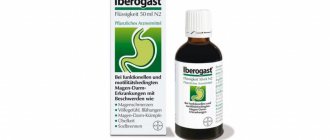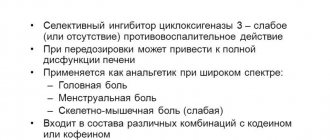Pharmacodynamics and pharmacokinetics
Taking this medication allows you to compensate for the insufficiency of external secretory function in the pancreas. At the same time, it has a proteolytic, amylolytic and lipolytic effect.
The enzymes that make up Pancreatin , namely lipase, alpha-amylase, chymotrypsin and trypsin , help break down proteins into amino acids, fats into fatty acids and glycerol, starch into monosaccharides and dextrins. The functional state of the gastrointestinal tract also improves, and digestive processes are normalized.
Thanks to trypsin, stimulated pancreatic secretion is inhibited, producing an analgesic effect.
In the alkaline environment in the small intestine, pancreatic enzymes are released from the dosage form because they are protected from the influence of gastric juice in the form of a shell.
The manifestation of maximum enzymatic activity occurs 30-45 minutes after oral administration. Pancreatin is not absorbed into the gastrointestinal tract; the substance is excreted along with the feces.
Instructions for medical use of the drug Penzital Gastro
Excipients: lactose, microcrystalline cellulose, sodium starch glycolate, povidone, talc, colloidal silicon dioxide, methacrylic acid copolymer, diethyl phthalate, titanium dioxide.
Description
White, round, biconvex film-coated tablets. Pharmacotherapeutic group: digestive enzyme agent
ATX code: A09AA02
Pharmacological properties
Compensates for insufficiency of exocrine pancreatic function and has proteolytic, amylolytic and lipolytic effects. The enzymes included in pancreatin (lipase, alpha-amylase, trypsin, chymotrypsin) promote the breakdown of proteins into amino acids, fats into glycerol and fatty acids, starch into dextrins and monosaccharides.
Improves the functional state of the gastrointestinal tract, normalizes digestion processes. Trypsin inhibits stimulated pancreatic secretion, producing an analgesic effect.
Pancreatic enzymes are released from the dosage form in the alkaline environment of the small intestine, since they are protected from the action of gastric juice by the membrane. Maximum enzymatic activity is observed 30-45 minutes after oral administration.
Indications for use
Replacement therapy for exocrine pancreatic insufficiency: chronic pancreatitis, pancreatectomy, condition after irradiation, dyspepsia, Roemheld syndrome (gastrocardiac syndrome), cystic fibrosis; flatulence, diarrhea of non-infectious origin.
Impaired digestion of food (condition after resection of the stomach and small intestine); to improve food digestion in persons with normal gastrointestinal function in case of errors in nutrition (eating fatty foods, large amounts of food, irregular meals) and in cases of chewing dysfunction, sedentary lifestyle, prolonged immobilization.
Preparation for X-ray examination and ultrasound of the abdominal organs.
Contraindications
Hypersensitivity to the components of the drug, acute pancreatitis, exacerbation of chronic pancreatitis.
Directions for use and doses
For oral administration. 1-2 tablets before meals, without chewing and with water (water, fruit juices). If necessary, take an additional 2-4 tablets with meals. In cases where higher doses of pancreatin are required, a doctor's consultation is necessary to prescribe a higher dosage depending on the symptoms (for example, reducing the severity of steatorrhea, abdominal pain).
The dose is determined individually depending on the degree of digestive disturbance. Adults usually take 1 - 2 tablets 3 times a day.
In children, the drug is used as prescribed by a doctor.
The duration of treatment can vary from several days (if the digestive process is disrupted due to errors in the diet) to several months or years (if constant replacement therapy is necessary).
Side effect
Allergic reactions. In some cases - diarrhea, constipation, discomfort in the stomach, nausea (the cause-and-effect relationship of the development of these reactions with the action of pancreatin has not been established, since these phenomena refer to symptoms of exocrine pancreatic insufficiency). With long-term use in high doses, the development of hyperuricosuria and an increase in the level of uric acid in the blood plasma is possible. In cystic fibrosis, if the required dose of pancreatin is exceeded, strictures (fibrous colonopathy) may develop in the ileocecal region of the ascending colon.
When using pancreatin in high doses in children, perianal irritation and irritation of the oral mucosa may occur.
Overdose
Symptoms: hyperuricosuria, hyperuricemia. Children are constipated.
Treatment: drug withdrawal, symptomatic therapy.
Interaction with other drugs
With the simultaneous use of pancreatin with iron preparations, the absorption of the latter may be reduced. Concomitant use of antacids containing calcium carbonate and/or magnesium hydroxide may lead to a decrease in the effectiveness of pancreatin.
special instructions
The safety of using pancreatin during pregnancy has not been sufficiently studied. Use is possible in cases where the expected benefit to the mother outweighs the potential risk to the fetus. In cystic fibrosis, the use of pancreatin in high doses is not recommended due to the increased risk of developing strictures (fibrotic colonopathy). The dose should be adequate to the amount of enzymes necessary for the absorption of fats, taking into account the quality and quantity of food consumed.
With long-term use, iron supplements are prescribed simultaneously.
Release form
10 enteric-coated tablets in strips. 1, 2, 3, 4, 5, 6, 7, 8, 9, 10, 11, 12 strips in a cardboard box along with instructions for use.
Storage conditions
At temperatures from +2° to +25°C, in a dry place, out of reach of children.
Best before date
3 years. Do not use after the expiration date stated on the package.
Conditions for dispensing from pharmacies
Over the counter.
Manufacturer
Shreya Life Sciences Pvt. Ltd., India
Send consumer claims to the representative office address: 111033 Moscow, st. Zolotorozhsky Val, 11, building 21 tel.
Indications for use of Penzital
Main indications for use:
- carrying out replacement treatment for exocrine insufficiency in the pancreas, for example, in chronic pancreatitis, pancreatectomy , post -dyspepsia , radiation , Roemheld syndrome or gastrocardial syndrome, cystic fibrosis ;
- diarrhea of non-infectious origin, flatulence ;
- impaired absorption of food, for example, after resection of the small intestine and stomach;
- the need to improve the digestion of food in people with normal gastrointestinal function with errors in nutrition - large amounts of food, fatty foods, irregular meals, as well as chewing dysfunction, a sedentary lifestyle and prolonged immobilization;
- preparation for x-ray examination or ultrasound of internal organs.
Penzital
Penzital
(English:
Penzital
) is an Indian enzyme medicine intended to normalize digestion. Penzital compensates for pancreatic insufficiency. Enzymes included in Penzital such as lipase, amylase and protease promote the breakdown and better absorption of carbohydrates, fats and proteins in the small intestine.
Dosage form and composition of Penzital
Penzital is available in the form of enteric-coated tablets. The active substance of Penzital - pancreatin, 212.5 mg, is located in the core of the tablet and provides minimal activity:
- lipolytic - 6000 FIP units
- amylolytic - 4500 FIP units
- total proteolytic - 300 FIP units
Excipients: lactose, titanium dioxide, diethyl phthalate, colloidal silicon dioxide, sodium starch glycolate, povidone, talc, methacrylic acid copolymer, microcrystalline cellulose.
Indications for use of Penzital
Penzital is indicated for the following diseases and conditions:
- chronic pancreatitis
- cystic fibrosis
- insufficiency of exocrine pancreatic function
- chronic inflammatory-dystrophic diseases of the stomach, intestines, liver, gall bladder
- conditions after surgical operations on the digestive organs or their irradiation, accompanied by impaired digestion of food, flatulence, diarrhea (as part of combination therapy)
- to improve food digestion in patients with a normal state of the digestive system organs with errors in nutrition, disorders of chewing function
- with a sedentary lifestyle, including prolonged immobilization for medical or other reasons
- in preparation for ultrasound or x-ray examination of the abdominal organs
Contraindications to the use of Penzital
Penzital is contraindicated for:
- acute pancreatitis
- exacerbation of chronic pancreatitis in the acute stage
- hypersensitivity to the components of Penzital
Use of Penzital by pregnant and nursing mothers
The FDA risk category for the fetus when using Pancreatin (the active ingredient in Penzital) is “C” (animal studies have shown a negative effect of the drug on the fetus, and there have been no adequate studies in pregnant women, but the potential benefits associated with the use of this drug in pregnant women are may justify its use, despite the risk.There is
no information on whether pancreatin (the active substance of Penzital) passes into breast milk during breastfeeding.Therefore, therapy with pancreatin in nursing mothers is not advisable.
How to take Penzital and dosage
Penzital is taken orally during or after meals, the tablets are not chewed and washed down with a non-alkaline liquid: water or fruit juices. The duration of treatment - from several days to several months or even years - is determined by the doctor, as well as the dose (especially for children). The dose is determined individually depending on the degree of digestive disturbance. For adults, Penzital usually prescribes 1-2 tablets 3 times a day.
Interaction of Penzital with other drugs
When taken simultaneously with antacids containing magnesium hydroxide or calcium carbonate, the pharmacological effect of Penzital may be reduced.
When taken simultaneously with iron-containing drugs, the effectiveness of the latter may decrease.
general information
According to the pharmacological index, Penzital belongs to the group “Enzymes and antienzymes”.
According to ATC, it belongs to the group “A09 Drugs that promote digestion (including enzyme preparations)” and has the code “A09AA02 Pancreatin”. Manufacturer: Shreya Life Sciences Pvt. Ltd. (Shreya Life Sciences), India.
On the website gastroscan.ru in the literature catalog there is a section “Enzyme preparations”, containing articles on the use of enzyme preparations in the treatment of diseases of the gastrointestinal tract.
Other medications in which pancreatin is the main active ingredient
Medicines in which pancreatin is the only active ingredient are registered in Russia (were previously registered): Vestal, Gastenorm forte, Gastenorm forte 10000, Creon, Creon 10000, Creon 25000, Creon 40000, Mezim 20000, Mezim forte, Mezim forte 10000, Mikrazim , Pangrol 10000, Pangrol 25000, PanziKam, Panzim forte, Panzinorm forte-N, Panzinorm 10,000, Panzinorm forte 20,000, Pancreazym, Pancrealipase 8000, Pancreatal Kirschner, Pancreatin-concentrate, Pancreatin-LekT, Pancreatin, Pancreatin tablets (solution found in the intestines ), Pankrelipase, Pankrenorm, Pancitrate, Festal N, Uni-Festal, Enzistal-P, Ermital.
Penzital has contraindications, side effects and application features; consultation with a doctor is necessary.
Back to section
Penzital - instructions for use (Method and dosage)
The tablets are intended for oral and are best taken before meals . In this case, ordinary water is suitable for drinking. It is contraindicated to use alkaline liquids for this purpose.
According to the instructions for use of Penzital, dose selection is carried out by a gastroenterologist, who must take into account the patient’s diet and the degree of enzyme deficiency. The average daily dosage for adult patients is: 1-2 tablets 3 times . It is allowed to increase the daily dosage to 16 tablets.
When treating small patients, dose selection is performed individually.
The course of therapy is determined by the attending physician and can last for several years.
Penzital tablets for intestinal problems No. 80
Compound
Active substance: pancreatin 212.5 mg with enzyme activity:
- lipase 6000 IU FIP;
- amylase 4500 IU FIP;
- protease 300 units FIP.
Excipients: lactose, microcrystalline cellulose, sodium starch glycolate, povidone, talc, colloidal silicon dioxide, methacrylic acid copolymer, diethyl phthalate, titanium dioxide.
Pharmacokinetics
Pancreatic enzymes are not absorbed from the gastrointestinal tract, as a result of which classical pharmacokinetic studies have not been conducted.
Indications for use
- Insufficiency of exocrine pancreatic function (including in chronic pancreatitis, cystic fibrosis).
- Chronic inflammatory-dystrophic diseases of the stomach, intestines, liver, gall bladder; conditions after resection or irradiation of these organs, accompanied by impaired digestion of food, flatulence, diarrhea (as part of combination therapy).
- To improve the digestion of food in patients with normal gastrointestinal function in case of errors in nutrition, as well as in cases of impaired chewing function, forced long-term immobilization, and a sedentary lifestyle.
- Preparation for x-ray and ultrasound examination of the abdominal organs.
Contraindications
Hypersensitivity to pancreatin; acute pancreatitis; children's age - depending on the dosage form.
Directions for use and doses
Inside. The drug is taken during or after meals, without chewing and with a non-alkaline liquid (water, fruit juices).
The dose is determined individually depending on the degree of digestive disturbance. Adults usually take 1-2 tablets 3 times a day.
In children, the drug is used as prescribed by a doctor.
The duration of treatment can vary from several days (if the digestive process is disrupted due to errors in the diet) to several months or years (if constant replacement therapy is necessary).
Storage conditions
At a temperature from +2°C to +25°C, in a dry place out of reach of children.
Best before date
3 years. Do not use after the expiration date stated on the package.
special instructions
Use in the acute phase of chronic pancreatitis is not recommended. It can be used in the phase of fading exacerbation when expanding the diet, if there are signs of digestive disorders.
For cystic fibrosis, the dose should be adequate to the amount of enzymes that is necessary for the absorption of fats, taking into account the quality and quantity of food consumed.
For cystic fibrosis, the use of pancreatin in doses of more than 10,000 units/kg/day (in terms of lipase) is not recommended due to the increased risk of developing strictures (fibrous colonopathy) in the ileocecal region and in the ascending colon.
In patients with cystic fibrosis, especially when taking high doses of pancreatin, hyperuricosuria may occur, so the concentration of uric acid in the urine should be monitored in this group of patients.
As a precautionary measure, if unusual abdominal discomfort occurs or changes in the nature of complaints during the use of pancreatin, especially when taken in doses of more than 10,000 IU lipase/kg/day, a medical examination is necessary.
With high lipase activity contained in pancreatin, the likelihood of developing constipation in children increases. Increasing the dose of pancreatin in this category of patients should be carried out gradually.
Digestive system disorders may occur in patients with hypersensitivity to pancreatin, or in patients with meconium ileus or a history of intestinal resection.
Description
Enzyme preparation.
Dosage form
Enteric-coated tablets (film) are white, round, biconvex.
Use in children
It can be used in children according to indications, in doses and dosage forms recommended according to age. It is necessary to strictly follow the instructions in the instructions for pancreatin preparations regarding contraindications for the use of specific dosage forms of pancreatin in children of different ages.
Action
Enzyme agent. Contains pancreatic enzymes - amylase, lipase and proteases, which facilitate the digestion of carbohydrates, fats and proteins, which facilitates their more complete absorption in the small intestine. In diseases of the pancreas, it compensates for the insufficiency of its exocrine function and helps improve the digestion process.
Side effects
From the digestive system: very rarely - diarrhea, abdominal discomfort, abdominal pain, nausea, vomiting; formation of strictures in the ileocecal and ascending colon in patients with cystic fibrosis when using high doses of pancreatin.
From the immune system: very rarely - immediate allergic reactions (skin rash, urticaria, sneezing, lacrimation, bronchospasm, dyspnea), gastrointestinal hypersensitivity.
From the metabolic side: with long-term use in high doses, the development of hyperuricosuria is possible; in excessively high doses, an increase in the level of uric acid in the blood plasma.
Other: when using pancreatin in high doses in children, perianal irritation may occur.
Use during pregnancy and breastfeeding
During pregnancy and breastfeeding, use is possible according to indications in cases where the expected benefit to the mother outweighs the potential risk to the fetus or infant.
Interaction
When used simultaneously with antacids containing calcium carbonate and/or magnesium hydroxide, the effectiveness of pancreatin may be reduced.
When used simultaneously with iron supplements, a decrease in iron absorption may occur.
The absorption of folic acid may be reduced when used simultaneously with pancreatin preparations.
The effect of hypoglycemic agents for oral administration (such as acarbose, miglitol) may be reduced when used simultaneously with digestive enzyme preparations containing enzymes that break down carbohydrates.
Overdose
Symptoms: hyperuricosuria, hyperuricemia.
Children have constipation. Treatment: drug withdrawal, symptomatic therapy.
Interaction
The simultaneous use of Penzital and antacid drugs with aluminum, calcium or magnesium ions can significantly reduce its effect. Iron supplements can reduce iron absorption.
Combination therapy with this drug with antithrombic drugs and acetylsalicylic acid reduces their effectiveness.
When treatment is prescribed simultaneously with non-selective monoamine reuptake inhibitors, the development of dangerous lethargy can be expected; with M-anticholinergic blockers, an increase in anticholinergic effect is noted, and alkaline liquids disrupt the pharmacodynamics of Penzital.
Analogs
Level 4 ATC code matches:
Digestin
Creon
Pancitrate
Mezim
Festal
Pankreoflat
Pancreazim
Enterosan
Panzinorm Forte
Panzinorm
Micrasim
Enzistal P
Pancreatin
Pangrol
Hermital
Abomin
The main analogues of this drug are represented by such drugs as: Gastenorm Forte, Creon, Mezim, Micrazim, Pangrol 10000, PanziKam, Panzinorm, Panzim Forte and others.
Also drugs with a similar effect are: Pancrelipase, Pancitrate Festal, Enzistal-P, Ermital and so on.
Reviews about Penzital
This drug is especially popular not only among patients suffering from various gastrointestinal diseases, but also in need of a cure for overeating. Therefore, reviews of Penzital are found everywhere. This drug is often prescribed during pregnancy , since during this period its quickly effective effect, which practically does not cause side effects, may be required. For example, it is actively used by women who feel severe heaviness in the stomach or nausea .
In addition, the drug can be prescribed to this group of patients to improve digestion and normalize the functions of the digestive tract. Although many ladies don’t even know exactly why Penzital helps during pregnancy. Therefore, you often find detailed explanations from specialists who tell you why Penzital tablets help best, how and when they should be taken.
In general, as reviews show, this drug is quite effective. However, despite the fact that it is enzymatic and, according to some, safe for the body, it is not recommended to take it without a doctor's prescription.
Penzital price, where to buy
This drug in enteric-coated tablets can be purchased at any Russian pharmacy. At the same time, the price of Penzital for 20 pieces can vary between 51-60 rubles.
- Online pharmacies in RussiaRussia
ZdravCity
- Penzital Gastro tab.
By. intestinal solution 212.50 mg 20 pcs Shreya Life Sciences Pvt.Ltd 59 RUR order
Penzital film-coated tablets 80 pcs. in Krasnodar
Latin name
PENZITAL
International nonproprietary name
Pancreatin
Release form
Enteric-coated tablets
Package
10 pieces. — strips (8) — cardboard boxes
Description
White, round, biconvex.
pharmachologic effect
Enzyme agent. Contains pancreatic enzymes - amylase, lipase and proteases, which facilitate the digestion of carbohydrates, fats and proteins, which facilitates their more complete absorption in the small intestine. In diseases of the pancreas, it compensates for the insufficiency of its exocrine function and helps improve the digestion process.
Indications
Insufficiency of exocrine pancreatic function (including in chronic pancreatitis, cystic fibrosis).
Chronic inflammatory-dystrophic diseases of the stomach, intestines, liver, gall bladder; conditions after resection or irradiation of these organs, accompanied by impaired digestion of food, flatulence, diarrhea (as part of combination therapy).
To improve the digestion of food in patients with normal gastrointestinal function in case of errors in nutrition, as well as in cases of impaired chewing function, forced long-term immobilization, and a sedentary lifestyle.
Preparation for x-ray and ultrasound examination of the abdominal organs
Directions for use and doses
The dose (in terms of lipase) depends on age and the degree of pancreatic insufficiency. The average dose for adults is 150,000 units/day. In case of complete insufficiency of exocrine pancreatic function - 400,000 units/day, which corresponds to the daily requirement of an adult for lipase.
The maximum daily dose is 15,000 units/kg.
Children under 1.5 years old - 50,000 units/day; over 1.5 years - 100,000 units/day.
The duration of treatment can vary from several days (if the digestive process is disrupted due to errors in the diet) to several months and even years (if constant replacement therapy is necessary).
Compound
1 tab. - Pancreatin 212.5 mg with enzymatic activity: amylase 4500 FIP, Lipase 6000 units of FIP, Protease 300 units of FIP Auxiliary substances: lactose, cellulose microcrystalline, sodium starch glycolate, povidon, talc, silicon dioxide colloidal, metaprilic acid copolymer, diettilate dioxide
Contraindications
Acute pancreatitis. Hypersensitivity to pancreatin.
Use during pregnancy and breastfeeding
The safety of using pancreatin during pregnancy has not been sufficiently studied. Use is possible in cases where the expected benefit to the mother outweighs the potential risk to the fetus.
Experimental studies have shown that pancreatin does not have a teratogenic effect.
special instructions
Use in the acute phase of chronic pancreatitis is not recommended.
For cystic fibrosis, the dose should be adequate to the amount of enzymes that is necessary for the absorption of fats, taking into account the quality and quantity of food consumed.
For cystic fibrosis, the use of pancreatin in doses of more than 10,000 units/kg/day (in terms of lipase) is not recommended due to the increased risk of developing strictures (fibrous colonopathy) in the ileocecal region and in the ascending colon.
With high lipase activity contained in pancreatin, the likelihood of developing constipation in children increases. Increasing the dose of pancreatin in this category of patients should be carried out gradually.
Digestive system disorders may occur in patients with hypersensitivity to pancreatin, or in patients with meconium ileus or a history of intestinal resection.
Side effects
When used in average therapeutic doses, side effects are observed in less than 1%.
From the digestive system: in some cases - diarrhea, constipation, discomfort in the stomach, nausea. The cause-and-effect relationship between the development of these reactions and the action of pancreatin has not been established, because These phenomena refer to symptoms of exocrine pancreatic insufficiency.
Allergic reactions: in some cases - skin manifestations.
From the metabolic side: with long-term use in high doses, the development of hyperuricosuria is possible; in excessively high doses, an increase in the level of uric acid in the blood plasma.
Other: when using pancreatin in high doses in children, perianal irritation may occur.
Drug interactions
When used simultaneously with antacids containing calcium carbonate and/or magnesium hydroxide, the effectiveness of pancreatin may be reduced.
With simultaneous use, it is theoretically possible to reduce the clinical effectiveness of acarbose.
With simultaneous use of iron supplements, a decrease in iron absorption is possible.
Storage conditions
In a dry place, at a temperature of 2–25 °C





